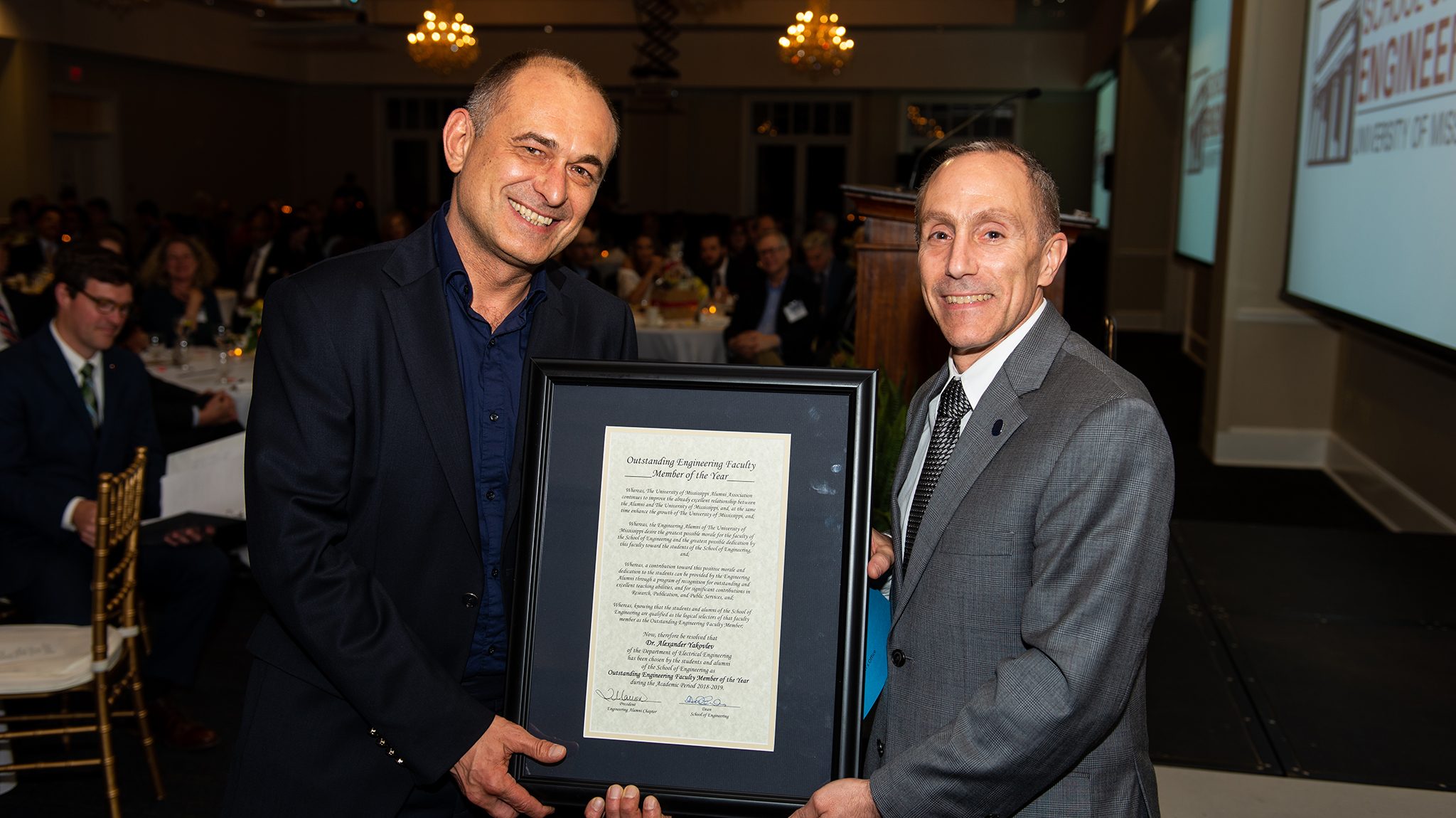
Electrical engineering professor Alexander Yakovlev (left) receives the 2019 Outstanding Faculty Award from School of Engineering Dean Dave Puleo during the school’s annual awards banquet last spring. Submitted photo
For the past two years, Alexander Yakovlev has been recognized for his efforts at the University of Mississippi. First, it was the 2017 Senior Faculty Research Award. Next came the 2018 Faculty Teaching Award. Earlier this year, the electrical engineering professor received his latest recognition – the Outstanding Faculty Award.
Yakovlev richly deserves the recognition, said Ramanarayanan Viswanathan, chair and professor of electrical engineering.
“Professor Yakovlev shows passion for the subject of electrical engineering, which is frequently commented on by students,” he said. “He is also a tireless researcher who has many quality journal publications to his credit. His recent research in antenna cloaking is keenly followed by many industrial partners in the BWAC wireless center.”
Dave Puleo, dean of the School of Engineering, said Yakovlev’s passion is contagious.
“Interacting with Professor Yakovlev, you quickly see that he brings great passion to whatever he does,” he said. “We greatly appreciate outstanding faculty, such as Professor Yakovlev, who excel in the classroom while also making significant contributions in research and professional service.”
Yakovlev, who previously also received the Junior Faculty Research Award in 2003, joined the UM faculty in 2000, after working as a postdoctoral fellow at North Carolina State University for almost two years.
“The Department of Electrical Engineering at Ole Miss has always had a fantastic research group in electromagnetics and antennas,” he said. “It was one of the best in the world and well known to researchers in the field. By reading his papers, I knew of Allen Glisson (chair emeritus and professor emeritus of electrical engineering) since I was an undergraduate student. He was like a legend to me.”
When Yakovlev received an offer to join the EE department, he immediately accepted.
“I considered it such an honor to become a faculty member in such a famous research group,” he said. “Since then, I’ve taught a variety of undergraduate and graduate courses.”
Motivation is essential for success in teaching, Yakovlev said.
“You have to have a passion for teaching,” he said. “You have to be an artist and a philosopher, to share and bring your knowledge, experience and broad vision in such a way to make it as a desirable process of learning something new.”
The rewards of teaching go much further than recognition and awards.
“For me, the most gratifying thing about teaching students is when I see that I’ve helped someone to learn and eventually make a difference in someone’s life,” he said.
Yakovlev’s research interests cover a broad range of directions in theoretical and computational electromagnetics. His focus is on the electromagnetic interaction with metamaterials, metasurfaces and 2D materials (such as graphene) from microwaves to optics.
“This concerns mathematical modeling, analysis and design of various artificial materials with numerous applications,” said Yakovlev, who co-authored a textbook, “Operator Theory for Electromagnetics,” in 2002.
He has also contributed to 90 journal papers published in professional scientific journals, 125 refereed conference papers, made 33 invited presentations at international conferences and symposia, presented 40 abstracts at international conferences and symposia, authored and presented 50 papers at local and regional conferences and written six book chapters.
Yakovlev’s community service includes serving as the associate editor of the Institute of Electrical and Electronics Engineers Antennas and Wireless Propagation Letters (2017-present), associate editor of the IEEE Transactions on Microwave Theory and Techniques (from 2005 to 2008), associate editor-in-chief of the Applied Computational Electromagnetics Journal (from 2003 to 2006), and vice chair of the Topical Program Committee of IEEE APS/URSI International Symposium and National Radio Science Meeting held in San Diego in 2017.
“I served several times as a member of the TPC of various professional meetings, as a reviewer for the conferences, and as chair and organizer of the special sessions,” he said. “I also serve as a reviewer for various professional journals in EE and physics.”
Born in the Ukraine, Yakovlev received his high school and college education in his hometown of Dnipro. After graduating with bachelor’s and master’s degrees in electrical engineering from Ukraine University, he earned his Ph.D. at the Institute of Radiophysics and Electronics of the National Academy of Sciences in Kharkiv, Ukraine. Yakovlev became employed as an assistant professor in the Department of Microwave Physics at Dnipropetrovsk State University in Ukraine.
“I tried to stay active in research, focusing primarily on theoretical electromagnetics and applied mathematics by contributing journal papers and attending professional meetings in the field,” he said. “In 1992, I was a recipient of the Young Scientist Award to attend the Electromagnetic Theory Symposium, Commission B in Sydney, Australia.”
Yakovlev said that trip became a starting point in his transition to a better life. In spring 1994, he began doctoral studies in electrical engineering with an emphasis in electromagnetics at the University of Wisconsin-Milwaukee. He graduated from UWM in 1997 and started his professional career in the United States.
“It took me about 10 years to complete the advanced degrees, but I don’t regret a thing,” Yakovlev said. “It was a good training in two different educational and research systems and environments, which helped a lot to clearly understand the U.S. educational system and to get involved in a global, international research community.”
Yakovlev has a daughter, Anastasia. His favorite hobby is alpine skiing, which has taken him to Colorado, and in recent years the French Alps.